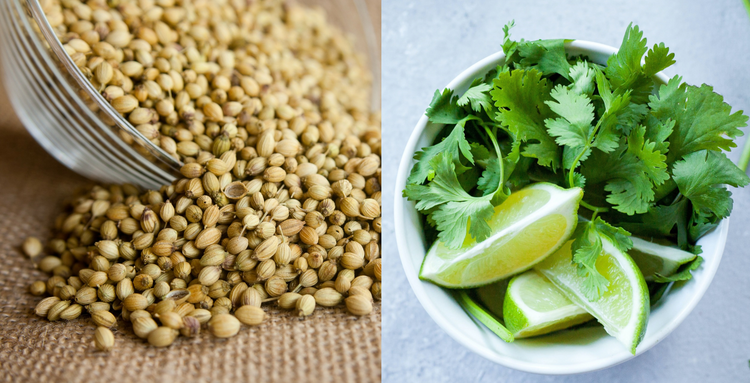
Coriander in Ayurveda: Exploring the Healing Powers and Holistic Benefits of Dhanyaka
Coriander is one popular herb that is used quite frequently to garnish our cuisine but seldom gets the appreciation it deserves for the health benefits it packs. Most people in Northern America know of coriander by its Spanish name – Cilantro, and gleefully oblivious to its benefits to our health, have been using its leaves or ground powder in their regular diets.
It is tough to say, what really makes Coriander such a popular herb worldwide. Maybe it is its astringent taste, or the unique aroma it emanates. Needless to say, it graces everything on our dining table, from curries to salads.
In ancient Ayurvedic traditions, coriander has been documented to possess the ability to ease gastrointestinal discomfort. In Ayurveda, coriander is known as both a cooling and a warming herb. Its leaves are deemed as cooling agents, and can be crushed to makes a paste that alleviate mild skin irritation. Its seeds, on the other hand, are deemed as warming agents and can be used to stimulate appetite, gather nutrient in the body and eliminate toxins that make the body vulnerable to diseases both chronic and benign.
In this article, we will look the plethora of benefits that this long underappreciated herb has in store for the human mind and body pertaining to the ancient texts of Ayurveda. From the lungs to the digestive system, let’s dive deep to identify coriander’s many benefits to our wellbeing.
Unlocking the Wellness Potential: Coriander's Health Benefits in Ayurveda
Digestive Harmony: Coriander's Role in Enhancing Digestion According to Ayurveda
We’ve already mentioned how Coriander helps in improving digestion by soothing gastrointestinal discomfort. Well, coriander’s benefits to our digestive tract aren’t limited to just that. Coriander also contains a compound called anthocyanins, which is known for its anti-inflammatory properties. This compound can not only aid in the digestion process, but can also heal ulcers. Coriander leaves can also enhance gut health by increasing the levels of gastric mucosal secretions. These secretions ultimately help protect the inner linings of your stomach against strong harmful acids.
Clear Vision through Ayurveda: Coriander's Contribution to Enhanced Eyesight and Eye Health
There are many benefits packed within corianders leaves. It possesses ample amounts of vitamin A, C ,and E along with carotenoid class of anti-oxidants, which are responsible for improving eye sight. Other benefits that coriander leaves can have on our vision include healing of conjunctivitis and macular/ age related disorders of the vision.
Bolstering Bone Health: Coriander's Ayurvedic Influence on Strengthening Bone Density
Coriander is a rich source of connective tissue enriching minerals like calcium, phosphorus, and magnesium, which make it an ideal food option to improve one’s bone density. We recommend you use coriander leaves with your dhal and vegetables as this can vastly improve bone density while also soothing aching joints pertaining to arthritis.
Warding Off Winter Woes: Coriander's Ayurvedic Support in Treating Flu and Colds
Apart from being home to vital nutrients like Vitamin A and beta carotene, Coriander seeds are also a rich source of anti-oxidants like Vitamin C. Now vitamin C is crucial to boost and maintain one’s immunity levels. According to popular Ayurvedic Expert Madhavi Rathod, coriander leaves and seeds contain at least 30% of the daily vitamin C that our body needs. This makes both coriander seeds and leaves an effective option in fighting cold and symptoms related to flu.
Glowing Radiance: Coriander's Ayurvedic Affirmation for Promoting Skin Health
According to the studies conducted by the California University of Ayurveda, coriander was found to effectively heal skin conditions like eczema, rashes and itchy skin. The linoleic acid found in coriander seeds is said to possess pain relieving properties and can be used to find reprieve from irritation of skin. Apart from the above benefits, coriander is also great in tackling mouth ulcers and sores.
Cholesterol Control through Ayurveda: Coriander's Impact on Lowering Cholesterol Levels
Cholesterol levels are a worry for many individuals; they are in fact the significant cause of heart diseases and strokes. Coriander contains an element called coriandrin, which is known to control the process of lipid digestion. This further result in bringing cholesterol levels down. Ayurveda has always prescribed coriander to aid in digestion, which is what makes it a potent herb against rising cholesterol levels.
Beyond the Ordinary: Unveiling Coriander's Diverse Health Advantages in Ayurveda
Although more studies need to be conducted in the below subjects, the early studies show ample promise for its future use as a potent remedy.
- Ancient practices have suggested that coriander was one of the herbs used to bring down sugar levels in the body. Recent studies have found that coriander in fact releases compounds in the body that cause insulin discharging and anti-hyperglycemic conditions that keep glucose levels in control
- Coriander has also been documented to facilitate hair growth. Early studies show that they can fortify follicles and reinvigorate the roots for growth of new strong hair.
Coriander as a Dietary Dynamo: Harnessing its Nutritional Power as an Ayurvedic Supplement
All parts of the coriander plant are edible and hold their own merits in improving the overall quality of our lives. The leaves can be used fresh and sprinkled on top of your soup, curry, or khichadi. You can also use ground powder made out of coriander seeds as a key spice in your cuisine.
Coriander can also blend well with other prominent herbs in Ayurveda. You can try any of the following to improve the flavor of your dish while also providing your body with ample nutrition.
Try the following combination:
- Coriander with fennel, cardamom and cumin – helps improve digestion
- Coriander with punarnava, manjistha, and Gokshura – supports urinary system
- Coriander with licorice and pippali – supports the respiratory tract.
As you can see, Coriander is a versatile herb that can be used in multiple ways to avail a plethora of health benefits. So if you don’t have its powder in your kitchen, or don’t use its leaves in your cooking, maybe this article would have done its job in convincing you to make this herb an integral part of your cuisine.
Note: The information in this article is intended for your educational use only and is not a substitute for professional medical advice, diagnosis, or treatment. Always seek the advice of your physician or other qualified health providers with any questions you may have regarding a medical condition and before undertaking any diet, supplement, fitness, or other health programs.





